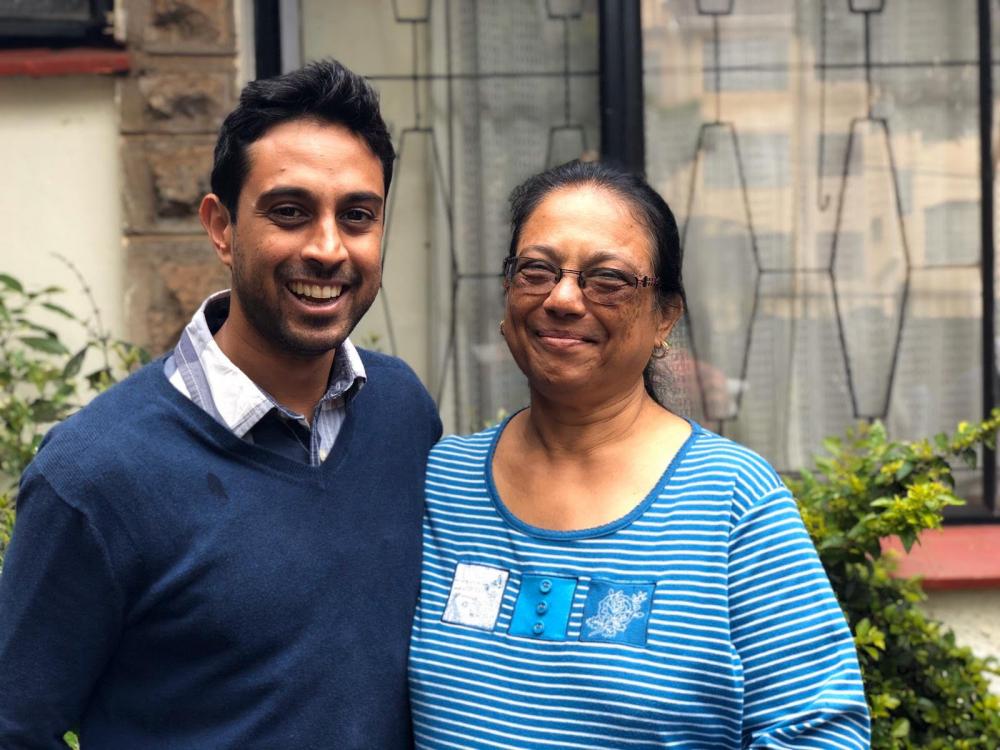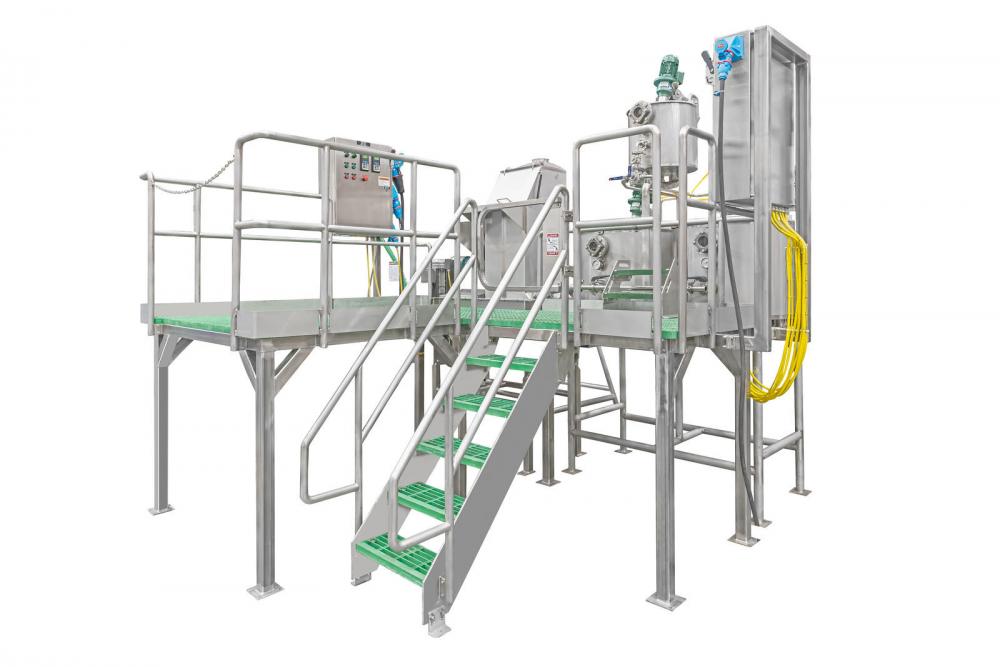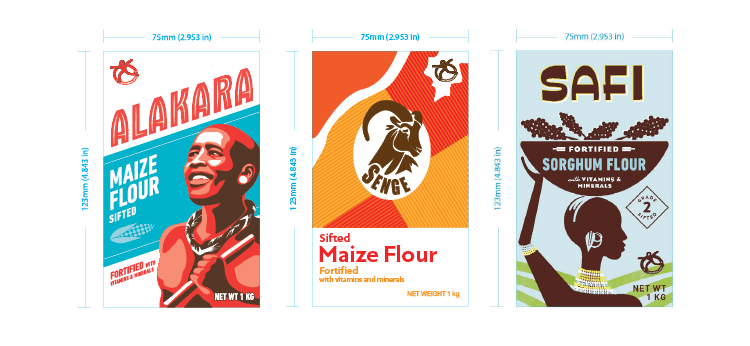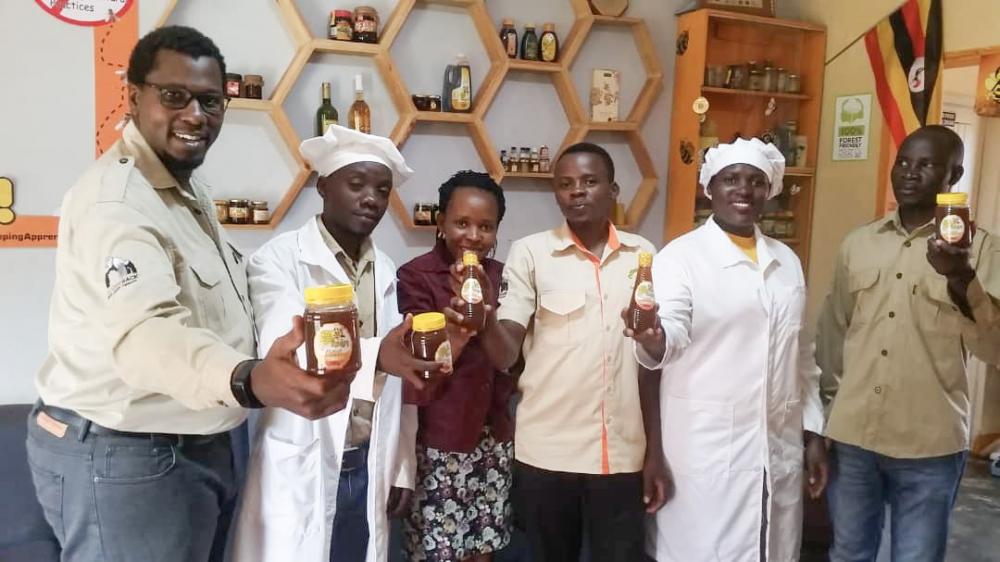Blog
Get Updates

Being an entrepreneur is not always easy, but for Tropical Lush CEO, Adarsh Shah, it’s a labor of love. “About three years ago, we moved from a small production kitchen to our current premises, which is larger. Our current facility has allowed us to manage logistics better, increase storage and improve our growth trajectory. Managing a growing business in Nairobi has its challenges, but we love it.”
As a fresh fruit juice business with increasing demand from new customers, challenges pop up. One being shelf life. “We started gaining new customers and reaching people farther away from our production facility, and therefore needed to improve the quality of our product over a longer period of time.” To increase shelf life, Adarsh consulted PFS volunteers who provided recommendations for new juice formulations. “The shelf life of the product used to range from two to three days, but due to improved formulation, we’re now at four to five days. One of the best things from this past year is that we’ve received great feedback from our customers and we attribute that to the improved formulation that PFS volunteers helped us with."
Tropical Lush has been working with PFS for two years and has gone through a lot of changes over the years. “We’ve hired new, highly skilled managers, doubled production and increased the number of deliveries to our customers. Having Johnson from PFS as a resource has been very helpful. He’s been on the phone with us to help when issues arise; it’s almost like having a partner in our business that can help me think through things.” Tropical Lush plans to move into a larger production facility in the near future where they can continue to grow the business. Until then, Adarsh still makes time to deliver product himself to clients around town, “I really enjoy the day-to-day and it’s always fun to meet clients face to face.”

Over 2 billion people around the world don't get adequate amounts of micronutrients in their diets like iron, vitamin A and zinc. Nutrient deficiencies can lead to stunted growth and life-long cognitive impairment in kids. Africa alone has the highest prevalence of undernourishment, with 20% of its population being affected. An important part of the PFS mission is to work with African food processing companies who provide healthy foods that support improved nutrition.
Project Peanut Butter (PPB), a nonprofit organization that seeks to advance the treatment of severe malnutrition through ready-to-use therapeutic food (RUTF) is one such client. RUTF is a nutrient-dense, locally produced peanut butter paste used for the treatment of severe acute malnutrition in children. PPB currently serves communities in Ghana, Malawi and Sierra Leone, and is expanding its operations to Côte d’Ivoire.
Partners in Food Solutions (PFS) and Project Peanut Butter have been working together since 2012 and have partnered on over 40 projects. Perry May, who retired from General Mills in 2015, has been volunteering on PPB projects since 2012 and has seen the impact of their work. “I really enjoy working with PPB. I’ve been involved with many of their projects and have seen a lot of business growth over the years and have even visited a PPB plant in Malawi. One of the current projects I am most excited about is their expansion project in Côte d’Ivoire,” Perry said.
With a new facility in Côte d’Ivoire, PPB will be able to reach a new population of people they didn’t have the opportunity to serve before. For the new plant, PPB was looking for recommendations to source a new piece of equipment to process their RUTF products.
After multiple discussions between PFS volunteers and PPB, they selected Anderson Dahlen Inc. (ADI), a custom design and manufacturing equipment builder based in Ramsey, MN, to design and build a RUTF processing system. “The reason we recommended them for the RUTF processing system was because we needed a vendor who had sanitary design for food equipment in mind. PPB was going to be producing a product for human consumption and they needed a piece of equipment that not only was safe and easy to use, but also easy to sanitize throughout the whole processing activity,” said Perry. “I worked with ADI when I was at General Mills and have known them since the early 90s. ADI also previously supplied PPB with a piece of equipment for their Ghana plant. “
ADI generously allowed PFS volunteers to bring ingredients into their facility to test make the product. This was vital to ensure the equipment worked efficiently and effectively before it was shipped to PPB. Perry explained, “When you’re working in Africa, there is one thing you tend to learn very quickly... if things don’t work right, it’s not going to be a quick fix overnight. It might be weeks until you get a new part and can fix something. Understanding that reality, it was extremely valuable that ADI let us bring ingredients like peanuts, milk powder and sugar into their facility to make peanut butter with the new equipment. Peanut butter is something you definitely don’t want splashed around your facility so we were really grateful that ADI opened up their facility for us to use as a small pilot plant.”
“We build food equipment for customers around the globe that we are very proud of, but I think this project probably made us feel even a little more satisfied than usual,” said Bill Olsen, the project manager from Anderson Dahlen. “This effort was particularly satisfying because of the end-user purpose. We were able to witness and participate in the production of some test products for the customer that we normally don’t get to engage with. The preliminary testing was important for us to conduct because it allowed validation of the system's mechanical and electrical control operations, while at the same time, validating the ability of the system to mix and process the specific ingredients into a finished product the client approved of.”
Even though ADI supplied PPB with a similar piece of machinery for their Ghana facility years back, this system was slightly different in process and scope and posed new challenges. “The end-user requested specific high amperage, quick-disconnect electrical connections for their eventual primary input power at their plant, which required slightly different termination and hookup hardware at the electrical control panels and drives. Because the system was also being shipped overseas, consideration also had to be given to the final sizes of various assemblies, as well as designing the parts of these assemblies with modularity to allow disassembly for nesting into shipping containers.”
After months of brainstorming, designing, fabricating and testing, the new processing equipment was recently containerized and shipped to PPB, where it will be assembled and go through additional testing. “We’re thrilled to have a custom piece of processing equipment that will be perfect for our RUTF product,” said Megan Manary, director of quality systems at Project Peanut Butter. “We’re so thankful for the PFS team, volunteers and Anderson Dahlen staff who donated over 200 hours and their expertise to this project. Through genuine partnerships like this, we’re able to continue our mission of improving food security across Africa and target vulnerable populations in need of more nutritious foods.”

“As soon as I learned Hershey was involved with Partners in Food Solutions (PFS), I knew I wanted to get engaged,” said Mary Marette, a senior design manager at The Hershey Company. “In 2015, I just started a new job at Hershey and saw PFS as an opportunity to engage with the company, work with others and learn by doing.”
Mary initially got involved with PFS in 2008 when she worked at General Mills and was encouraged by her director to get involved. “My boss at General Mills was instrumental in getting our team involved with PFS. She really advocated for us to apply our expertise outside our day-to-day work and develop our skills in new and varied situations,” Mary, who now works at Hershey, strives to bring a similar experience to her team at Hershey.
Kelly McManus, an associate design manager and relatively new face at Hershey, had just started on Mary’s team when Mary suggested she get involved with a PFS project. “As I looked at Kelly, I saw someone who was new to Hershey and needed an opportunity to engage and stand out. I thought having Kelly join me on a PFS project would be a great way for her to meet people, get more engaged, do hands-on design work and most importantly develop her leadership skills,” Mary said. An opportunity arose for them to work together on a PFS project designing a logo and packaging for three Kenyan milling companies.
“This project was definitely something that got me out of my comfort zone and pushed me both professionally and personally,” Kelly said. “My day job primarily focuses on overall design strategy, so joining a PFS project allowed me to dust off my boots and get more involved in the actual design work. I had never worked on a global initiative before, so this was a completely new experience for me. The market is really different than the United States’ and we had to learn about their customers, shelf set, culture, etc. The project included many 6:00 am calls and asking a lot of questions like ‘What’s the difference between Maize and Sorghum?’ and ‘How is the product typically transported?’”
"To see a visual representation of our client's everyday lives, we requested pictures of their surroundings. We then received images from the client on WhatsApp of them in the middle of their field surrounded by goats. When we asked what the significance of the goats were we learned that ‘he goats’ represent pride, and it was a treasure to own a goat, especially when there was a drought. This type of real-time sharing and learning about a client and their culture first-hand made the project much more real.” And, Kelly said, it was a great opportunity to work with her supervisor on something completely new and different. “My boss was incredibly helpful throughout the whole project. Since she had participated in PFS projects before, she helped set the expectation and guided me through leading the creative direction for the three milling companies.”
With support from a Minneapolis-based creative agency, the project finished in November with four unique packaging designs. These designs will now be sent to a local printer in Kenya where they will be printed on packaging for the local market. “I am really proud of Kelly,” Mary said. “In addition to learning about a new client and getting back into hands-on design work, Kelly also had to think about where the client was with technology, what type of printers they had access to and what colors and types of branding would resonate with a culture that was different than her own. Her involvement in PFS truly illustrated her ability to deal with ambiguity, showcased her talent, revealed her desire to learn and engage, and highlighted her leadership skills. Kelly went above and beyond, all while using her skills to give back.” And while working with a client thousands of miles and many, many time zones away she also learned a little something extra about her colleague, “I also learned that Kelly is not a morning person.”

Deborah Korkoi Moi is a PFS Apprentice at Eden Tree, a leading fruit, vegetable and herb supplier in Accra, Ghana. Deborah has been an apprentice at Eden Tree for 3 months and has been gaining experience in HACCP development and implementation, food quality and safety monitoring, internal and external auditing, SOPs and more. “PFS has done well investing in my training and development that will equip me to become a food safety professional in the future. PFS has also allowed me to gain real-life experience in the food industry that I couldn’t find anywhere else.”
PFS: Why did you decide to get involved with PFS?
DKM: I chose to be an apprentice at PFS because my professional aspirations parallel that of PFS' mission in terms of increasing the competitiveness of the African food processing sector. I saw PFS as the right organization to guide me with purpose, foster my ambitions and help connect me to my career pathway.
PFS: What does being an apprentice at Eden Tree mean to you?
DKM: Being an apprentice at Eden Tree presents a great opportunity to learn from an established facility and one of the best fruit, vegetable and herb suppliers in the country. Currently, I am responsible for: inspecting food samples for growth of particular types of molds and yeast, ensuring that food manufacturing processes conform to government, processing, consumer and industry standards, evaluating the color, flavor, and texture of food, ensuring that water used to wash produce is clean, monitoring the temperature of the chillers used for the storage of produce and organizing training for production staff to ensure they practice good manufacturing practices.
Ensuring food gets to consumers safely and will not cause any adverse health effects gives me the utmost inner joy.
PFS: What skills are you learning as an apprentice?
DKM: Being a PFS apprentice in the Quality Assurance Department at Eden Tree has been really rewarding. I’ve gotten the opportunity to practice many skills and increase efficiencies and effectiveness of our food safety protocols. Specifically, I am learning:
· Food quality and safety monitoring
· Product development and improvement
· Internal and external auditing
· SOPs and manual development
· HACCP development and implementation
· Communication and decision-making
PFS: Where do you see yourself in five years?
DKM: I hope to be a R&D food technologist creating new products from indigenous produce in Ghana that are safe and nutritious. I also want to pursue a Ph.D. in functional foods and nutraceuticals. In five years, the skills I am learning as an apprentice coupled with what I will learn in graduate studies will allow me to shape the future of food processing here in Ghana and beyond.
Overall, I want to continue to promote the consumption of healthy, safe and nutritious food and enrich African communities economically.

General Mills in Europe decided to try something different when forming a volunteer team to work with Golden Bees, an Ugandan company that produces honey, beeswax, and propolis (bee glue). The team was only comprised of General Mills employees based in Europe. And while there are many benefits to working on a cross-company, geographically diverse team that is the usual makeup of a PFS volunteer team, the Golden Bees volunteer team discovered many benefits to collaborating on a project together.
One of the first people to join the team was Carlota Gonzalo, an experienced PFS volunteer and quality ingredients manager based in Spain who specializes in commodities such as honey, cereals and edible oils. “The Golden Bees project was unlike any previous PFS project I had been involved with,” Carlota said. “Having a team of volunteers from General Mills - Europe allowed us to expedite the project onboarding phase and start work really quickly. Typically it takes some time to learn about the other corporate partners and their work styles, but we already understood one another. Plus, scheduling meetings was a lot easier since we were all on the same continent and not dealing with different time zones,” she continued.
Within the Golden Bees project, there were two very different parts - designing a quality management system and mini quality control lab, and creating a computerized accounting system. Carlota focused on the quality management and lab, while other colleagues focused on the accounting system. Carlota, although familiar with quality management systems due to her background, was not familiar with the lab portion. “I love working globally and learning new things so I wasn’t afraid to get involved in a project where there was a portion I was unfamiliar with,” Carlota said. "I gained a lot from the Golden Bees project because I made new connections in the General Mills R&D and lab departments that I had not previously made, as well as gained a better understanding of what goes on during honey lab testing. I now use that new knowledge in my day job when I am communicating with honey suppliers. I’m able to do my own job better and also get to build a deeper relationship with my clients, who really appreciate the honey lab experience I’ve gained.”
After the project ended, Carlota and her team received great feedback and heartfelt thanks from Golden Bees Founder Brian Mugisha. “We are grateful for the immense contribution you have extended to us. And to the entire PFS and General Mills staff, you are such a wonderful group of people and there is no way we can pay you back other than working towards improving Golden Bees to one day be a General Mills of Uganda!”
Because of the General Mills Europe team’s recommendations, Golden Bees has enhanced their lab and increased the quality team’s capabilities. They are also using an inventory management tool built by General Mills volunteers. It’s a significant contribution to a company that supports 2200 local beekeepers annually and Carlota and the team went on to win the Global Volunteer Award, presented by the General Mills Foundation, for their involvement with PFS and the Golden Bees project.
